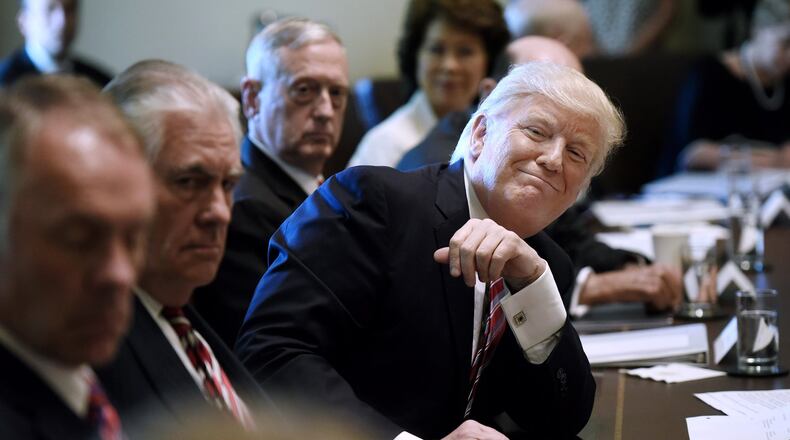For anyone who has ever contemplated whether a business CEO could run the U.S. government better than a politician, we have Test Case A in the White House.
Donald Trump is six months deep.
So I wandered among the people most likely to have insights that could turn into books or at least heated classroom discussions on Trump’s leadership effectiveness: nearly 10,000 business professors, management researchers and leadership consultants at the Academy of Management’s international annual meeting in downtown Atlanta last week.
Forget the president’s policies and — if you can — your own political views, I asked those at the meeting and others I contacted later. Management-wise, how’s our chief executive officer doing?
I saw some faces contort.
For starters, describing Trump as a business CEO gave several business professors pause.
“I don’t see him as a CEO,” said Joseph Lampel, a professor who teachers leadership at the University of Manchester in the United Kingdom. “He is an entrepreneur…. This is not somebody who ran a larger organization in a business sense.”
Jerry Davis, a University of Michigan professor of management, said Trump’s background heading a family-run enterprise centered on real estate development is different from leading a hierarchical Fortune 500 company with many tens of thousands of employees scattered around the world.
The bigger one — which is the kind of operation run by Rex Tillerson, ExxonMobil's chief before becoming Trump's Secretary of State — has more in common with government operations, Davis said.
Project-by-project
Real estate focuses on negotiating project-by-project on ventures that have a somewhat set timeline, he said. “It gives you a different kind of mindset than running an ongoing organization that was there before you were there and will be there when you leave.”
“You don’t have the same incentives to take a long-term orientation,” he said.
“In the same way being senator may not be great training for being a president, being a rel estate developer may not be great training to be president.”
Trump is not what we’re used to in the White House.
His pedigree is as a dealmaker, really rich guy, media star, shocker and unabashed ego machine. (Hey, you gotta love yourself before you can love others.) He never served before in elected office or as a high-ranking officer in the military or in a top appointed position in government.
So whether he gave you hope, delight or the willies during the campaign, we all knew to expect something different.
“His style and manner is the dramatic departure from predecessors, not so much his policy,” said Peter Klein, a Baylor University professor who is part of a center for entrepreneurship and free enterprise.
For one thing “he airs a lot of dirty laundry in the public,” Klein said.
Also, the president berates his subordinates publicly, which, Klein informed me “is certainly not what the leadership and management textbooks would tell you.”
Other characteristics?
Researchers said Trump seems to act overwhelmingly on impulse, which some suggested isn’t good in the long term.
A researcher’s view
But I kept asking professors: what has Trump done well from a management researcher’s point of view?
They told me he showed leadership traits during the campaign by successfully articulating a vision of a problem and communicating ways to fix it, which helped him win the White House.
“He is a great salesman,” Lampel, the professor from the UK, said.
But he said Trump hasn’t yet made a crucial transition: “When you run for election, you are a salesmen. But when you are a president, you are a persuader.”
Lampel said he’s also been surprised that president hasn’t brought stronger control and stability inside the White House.
Maybe that was too much to expect.
Trump wrote in his book, “How to Get Rich,” that a visitor compared the scene in his corporate offices to “a family fight in progress” and that “if you want smooth sailing every day, move to the Mediterranean.”
Instead, we’re on the North Sea.
“The chaos to creation ratio is way off,” said Rick Gilkey, an Emory University professor of both business and psychology.
Gilkey said he’s worked with chief executives at large companies, including Home Depot, GE and Johnson & Johnson.
He told me he’s convinced Trump “couldn’t get a job as an upper level manager at a Fortune 500 company.”
“If you don’t have a sense of humility, then you stop learning, and you start imposing, and you create a path of destruction, which frankly is what we are seeing.”
So, the profs I spoke with didn’t shower the president with management kudos.
An un-leader?
One professor, Henry Mintzberg at McGill University in Montreal, told me, “From what I can gather, he is the antithesis of leadership. There’s no evidence of anything remotely like leadership.”
Then he assured me: “I’m not talking about politics.”
I think every professor I spoke with also pummeled the idea that running government like a business is generally a good idea.
The two aren’t measured the same way. Government’s focus is not to make a financial profit.
“I understand the wish to make agencies more efficient,” said Klein, the Baylor professor. “But at the end of the day, government organizations are not like businesses.”
I wonder if our president might agree, at least in one sense, based on what he said in an Associated Press interview earlier this year.
“Here, everything, pretty much everything you do in government, involves heart, whereas in business, most things don’t involve heart,” Trump said.
He added this jarring conclusion (and material for another column): “In fact, in business, you’re actually better off without it.”
Is he right?
Find Matt on Facebook (https://www.facebook.com/mattkempnercolumnist) and Twitter (@MattKempner) or email him at mkempner@ajc.com.
Other Kempner's Unofficial Business columns: http://www.myajc.com/news/opinion/matt-kempner-unofficial-business/j9F7R2mOGomS5FMjfhho2O/
About the Author
Keep Reading
The Latest
Featured




